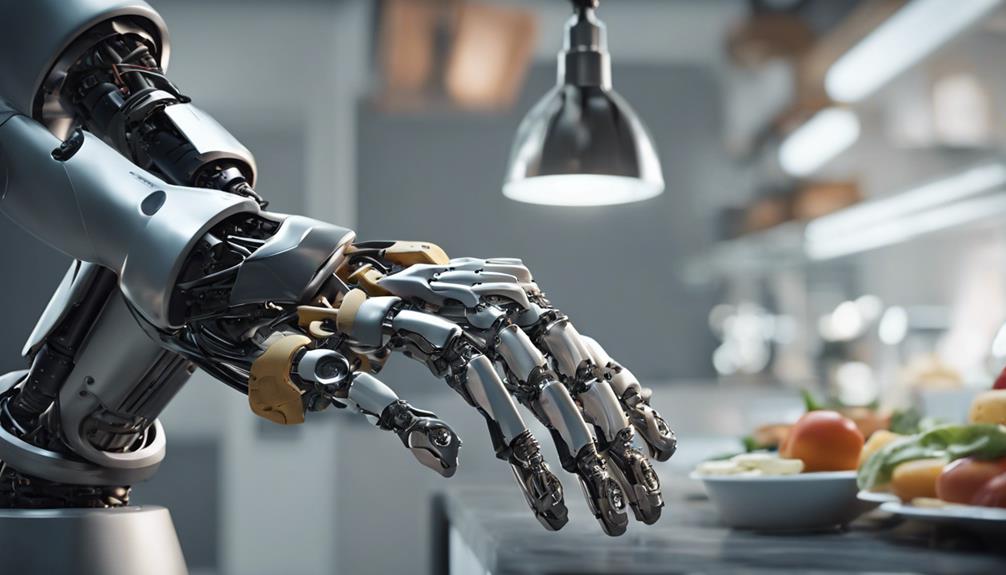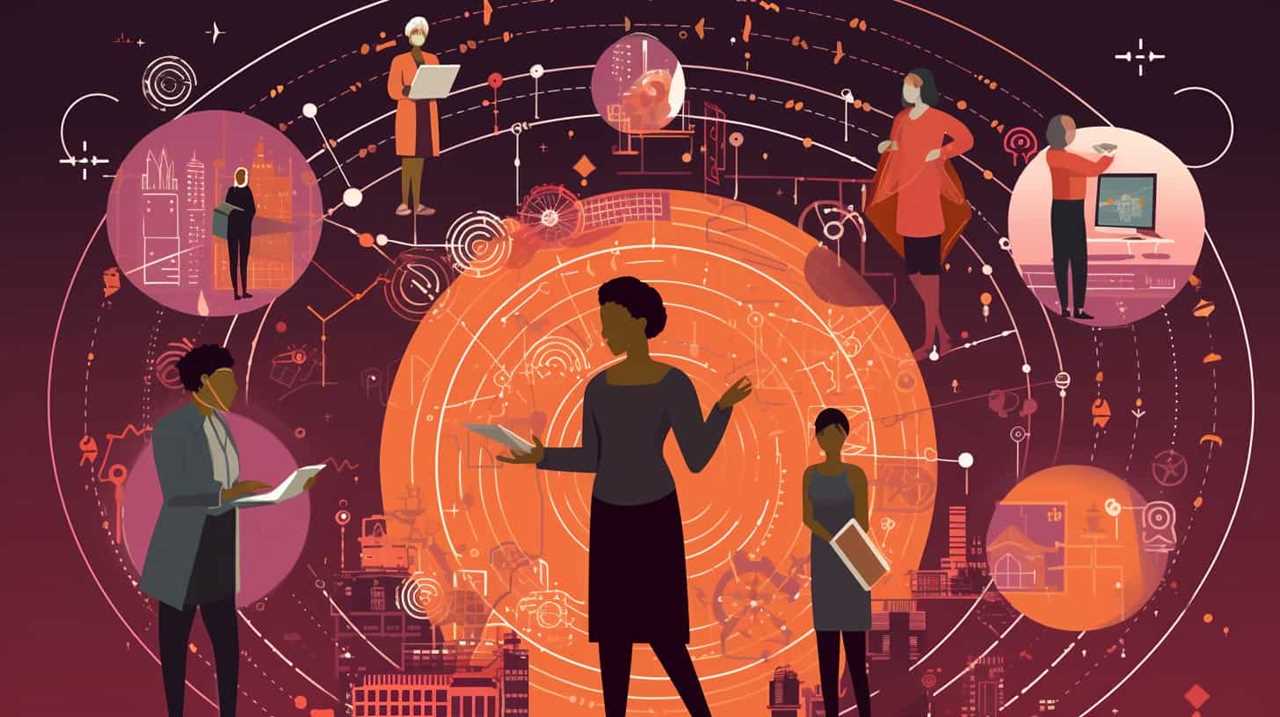With technology advancing rapidly, the increasing concern of AI replacing all job roles has become a prominent issue in multiple industries. The intricate relationship between artificial intelligence and human labor is reshaping traditional employment dynamics, sparking conversations about the outlook for jobs.
With projections indicating significant disruptions by 2025, understanding the nuances of this transformation becomes paramount. The potential ramifications, challenges, and opportunities that AI presents are vast and multifaceted, leaving many to ponder the intricate dance between automation and human expertise.
Key Takeaways
- AI automation will significantly impact job roles globally by 2025.
- Certain industries will face substantial job replacement by AI.
- Upskilling and adapting to new skills are crucial for job market competitiveness.
- AI integration offers efficiency but human creativity remains irreplaceable.
Implications of AI in Job Automation
The profound implications of AI in job automation are poised to revolutionize the workforce landscape, ushering in a new era of technological transformation and redefining traditional employment paradigms. Research indicates that AI is set to replace 85 million jobs globally by 2025, with various industries facing significant impacts. Jobs such as customer service representatives, drivers, programmers, research analysts, and paralegals are at risk of being replaced by AI advancements. This shift towards automation will not only affect individual job roles but also disrupt hiring practices, reshaping the job market as we know it.
The global impact of AI on job automation highlights the critical need for individuals to adapt and acquire new skills to remain competitive in an increasingly automated workforce. While the rise of AI may be slower than media portrayals suggest, its long-term implications for job automation are substantial. Industries such as healthcare, agriculture, and manufacturing are already experiencing the transformative effects of AI, emphasizing the necessity for individuals to develop versatile skills suited for the evolving job landscape.
Jobs AI Will Replace in the Future

Anticipating the Evolution of Workforce Dynamics with AI's Substitution of Roles
In the near future, AI is poised to revolutionize various industries by replacing specific job roles. Customer service representatives face the risk of AI takeover as automation and chatbots handle inquiries more efficiently. The advent of autonomous vehicles is gradually diminishing the necessity for human drivers, putting car and truck drivers at risk of being replaced by AI technologies. Moreover, generative AI tools like ChatGPT are showing promise in automating coding tasks, potentially impacting computer programmers. Paralegals and market research analysts are also on the radar for AI replacement, as artificial intelligence systems become more adept at handling legal documentation and market analysis tasks. This imminent transformation in job dynamics signifies a wave of job loss for these professions as automation continues to advance, underscoring the importance of upskilling and adapting to the evolving technological landscape.
| Jobs AI Will Replace in the Future | ||
|---|---|---|
| Customer Service Representatives | Paralegals | Autonomous Vehicles |
| Computer Programmers | Generative AI | Market Research Analysts |
Benefits of AI Integration in Workplaces
In the realm of modern workplaces, the seamless integration of AI technologies heralds a new era of efficiency and productivity. AI integration in workplaces offers a myriad of benefits. It saves time on tedious tasks through process automation, allowing workers to redirect their efforts towards more productive endeavors.
Furthermore, the development of AI creates new job opportunities, such as machine learning engineers and AI ethics specialists, requiring workers to acquire new skills to adapt to these roles. Human workers play a crucial role in training, maintaining, and monitoring AI systems, highlighting the symbiotic relationship between AI and human labor.
AI also enhances decision-making processes by providing valuable insights and improving operational efficiency, ultimately driving organizational success. Additionally, the integration of AI in content creation and legal processes helps streamline workflows and ensure compliance.
Jobs AI Won't Replace

Unquestionably, certain professions stand resilient against the encroachment of AI, safeguarded by the intricacies of human cognition and interaction. Jobs demanding complex problem-solving, creativity, and emotional intelligence, like teachers and therapists, are less likely to succumb to automation. Roles reliant on human interaction, empathy, and personal touch, such as customer service managers and social workers, remain secure from AI disruption.
Furthermore, tradespeople like plumbers and electricians, who engage in hands-on work requiring specialized skills, are not easily replaceable by AI. Occupations operating in unpredictable environments and involving non-routine tasks, such as firefighters and artists, are also less susceptible to automation.
Moreover, professions mandating strategic decision-making, critical thinking, and adaptability, such as senior executives and innovators, are poised to withstand the AI wave. These domains exhibit a resilience rooted in the unique qualities of human cognition, emotional connection, and specialized expertise that AI struggles to replicate.
Preparing for AI Disruption in Workforce
As the landscape of work evolves in response to the advancing capabilities of AI, organizations and individuals must proactively equip themselves to navigate the impending disruptions in the workforce. The following strategies can help in preparing for AI disruption:
- Understand the Impact: Recognize the potential effects of AI automation on job roles within your industry. Stay informed about which jobs are at risk of being replaced by AI, such as customer service representatives, drivers, and paralegals.
- Skill Enhancement: Invest in upskilling and reskilling programs to adapt to the changing demands of the workforce. Develop expertise in areas where human capabilities are irreplaceable, like creativity, emotional intelligence, and complex problem-solving.
- Embrace AI Integration: Explore how AI is reshaping industries like healthcare, finance, and education. Identify opportunities to collaborate with AI technologies to enhance productivity and efficiency in your job role.
Frequently Asked Questions
Can Artificial Intelligence Replace All Jobs?
Artificial intelligence has the potential to replace a significant number of jobs globally, impacting industries across the board. The integration of AI in various sectors is reshaping traditional roles, leading to widespread disruptions in employment patterns.
What Jobs Will AI Replace by 2050?
By 2050, AI is poised to replace roles like customer service representatives, drivers, computer programmers, research analysts, and paralegals. Automation and AI advancements are transforming industries, leading to potential job disruptions across various sectors.
Will AI Eventually Replace Everything?
While AI's potential seems boundless, the notion of it replacing everything remains a topic of debate. AI's rapid evolution may revolutionize countless aspects of our lives, yet the extent of its ultimate reach remains uncertain.
What Jobs Are AI Proof?
Professions that demand high levels of creativity, emotional intelligence, and critical thinking skills are often considered AI-proof. Jobs involving complex tasks, human interaction, and unique human skills are less likely to be replaced by AI automation.
Conclusion
In conclusion, the pervasive presence of AI in various industries heralds a future where automation alters employment landscapes.
While some jobs face replacement, the benefits of AI integration are vast.
To navigate this transformative era, individuals must adapt and upskill to stay relevant in an evolving workforce.
Embracing this change with agility and foresight will be crucial for success in a world where artificial intelligence reshapes the job market.









